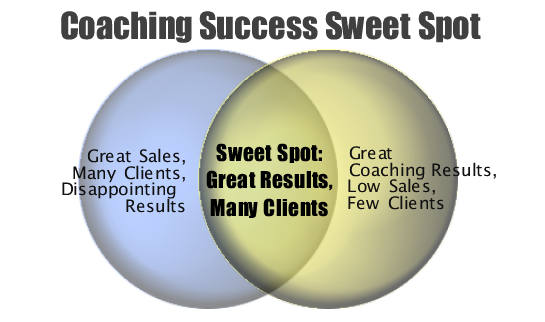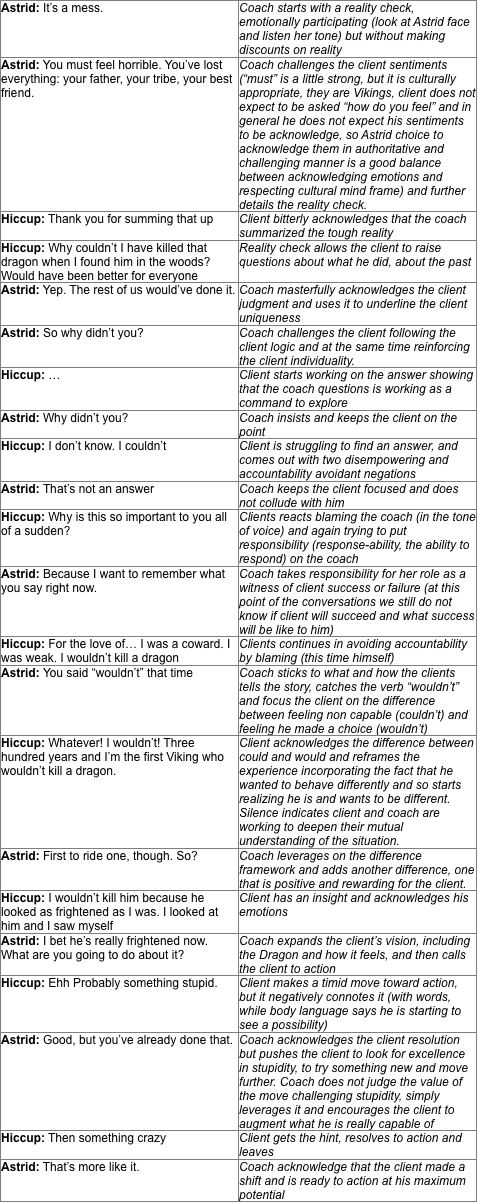 Wondering how you can become a successful life or business coach?
Wondering how you can become a successful life or business coach?
There are three main approaches to becoming a successful business or life coach. The first, I call the Entrepreneurial Coach. The second, is the Professional Coach. The last is the Sweet Spot. Let me explain:
1. The Entrepreneurial Coach* usually has a strong business, marketing and sales background and either a juicy niche or a smoking hot specialty. This coach knows how to attract the right clients and how to encourage them to buy. However, if s/he over relies on her business smarts, s/he can get caught on the hamster wheel of constantly having to market and sell, in order to keep his/her coaching roster full.
Why? Unless clients experience fantastic results quickly, or at least maintain their motivation long enough to experience extraordinary results, they tend to drop out of coaching within a few months. That means the entrepreneur coach has to constantly close new sales just to maintain a good income. For most coaches, this is exhausting and unsatisfying.
Worse yet, if clients quit before they're delighted, the entrepreneur won't maximize their number of all-important testimonials, case studies and viral buzz - the stuff that makes for a friction-free marketing and sales engine.
2. The Professional Coach*, on the other hand, has great coaching skills, either from decades of coaching or from a few years of coach-specific training. S/he knows how to elicit amazing results for his/her clients and as a result, clients stay month after month, or buy again and again. However, s/he may know little about effective marketing and sales strategies and as a result, too few clients ever sign up in the first place. That means too few potential clients ever find out about the professional coach, so s/he's constantly searching for that rare client who's willing to pay his/her fees.
Sadly, this coach may have spectacular results to point to, but often fails to share them with potential clients, who increasingly, are looking for 'proof' that their coach really knows what s/he's doing.
* In both cases above, the coach is forced into a situation where s/he needs his/her clients. The entrepreneur always needs new ones. The professional needs to hang onto the ones s/he has. Otherwise, both risk losing their incomes. When you need your clients, your focus is on yourself, instead of on helping them. To reach the coaching sweet spot, your needs must be met, so you can focus all your energy on helping your clients get those awesome results. Otherwise, something's got to give. It's way harder to maintain a sustainable coaching business when you have to focus on your own needs instead of clients' needs.
However, there are some entrepreneur coaches who really are good at coaching and most of their clients are quite happy and loyal. And there are professional coaches who get it when it comes to marketing and sales, so they're not desperate to get and keep clients. These exceptional coaches are moving into the Sweet Spot.
3. The Sweet Spot: This is the coach who has the skill to produce awesome results quickly and to keep producing results for months or even years. That keeps current clients wanting more and paying for it happily. At the same time, this coach has his/her marketing message down cold, has expertise that new people will buy and knows how to communicate and form client relationships (a.k.a. marketing and sales). Of course, those ever important testimonials, case studies and viral buzz come easily to this coach.
When you reach the sweet spot, you aren't desperate to make new sales and you don't cling to your old clients, trying to squeeze out a few more more dollars. You naturally meet your own needs and you can focus all your energy on meeting your clients' needs and helping them get what they want. Happy clients attract more happy clients.
I call this coach The Master. Everything we do at School of Coaching Mastery is designed to move our coaching students into the sweet spot by helping them become masters, faster.
Marketing programs help entrepreneurs communicate and sell to clients, but are useless when it comes to the critical skill of getting coaching results and keeping clients.
And most coaching schools will only get you started on becoming a professional coach - who may never get clients. At SCM, we give away that part of our program for free and focus our real attention on helping our paid members become masters and enjoy that sweet spot, sooner.
Turn your five-figure business into a six-figure coaching business and turn your six-figure business into a seven-figure coaching business: Become a Master Coach.











 et 7 questions to banish your confusion about becoming a business or life coach.
et 7 questions to banish your confusion about becoming a business or life coach.
